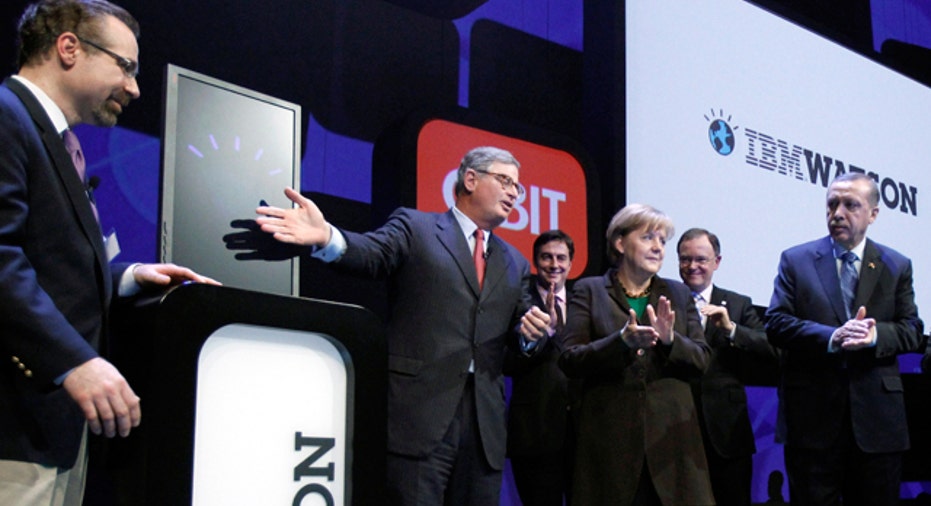IBM's 'Watson' to Take on Health Care

Fresh off his victory on "Jeopardy!", Watson now faces a new challenge: developing smart applications for the health-care industry. Experts say he has the potential to transform health care. Oh yeah, Watson is a computer.
The IBM supercomputer with an understanding of human language captured headlines in February when he beat out former "Jeopardy!" champs and is now looking to conquer the challenge of embedding current medical data into clinical practice.
With Watson, practitioners will be able to acquire, share and communicate knowledge and use evidence-based research to inform diagnostic and treatment decisionsan enticing prospect, experts say, in an era of Big Data, in which the output of information in health care alone is occurring at a rapid pace.
It would take almost two decades to embed all this medical data into clinical practice, says Dr. Michael Sherman, chief medical officer at Harvard Pilgrim Healthcare.
Not so with Watson, experts say.
Operating from a cloud-based environment, Watsons ability to analyze the meaning and context of human language, and process information to find precise answers can help health-care decision makers unlock important knowledge and facts buried within huge volumes of informationfast.
Watson can also provide doctors with answers they may not have considered to help validate their own ideas or hypotheses.
Though targeted for commercial release in about 18 to 24 months, Watson has already shown its muster. In February, in a unique man-versus-machine "Jeopardy!" competition, Watson rivaled human champions and won. Watson was able to decompose language using IBMs Deep Question Answering (DeepQA), natural language processing and machine learning capabilities.
To expand Watsons capabilities to health care, IBM is collaborating with Nuance Communication Inc. whose systems for the diagnosis and treatment of patients involve speech recognition and clinical language understanding. In turn, Watsons technology expands Nuances system capabilities from recognizing what was said to understanding its intent and providing guidance.
A new kind of medical student
The same architecture that was used for "Jeopardy!" is being used for medicine, but this time Watson is being fed specific medical content. Physicians at Columbia University are helping identify critical medical issues in which the Watson technology may be able to contribute.
Similarly, physicians at the University of Maryland are working to identify the best way a technology like Watson could interact with practitioners to heighten efficiency and provide the maximum assistance.
According to Dr. Eliot Siegel, professor and vice chair in the University of Marylands Department of Radiology, Watson is being exposed to textbook, journal and Internet resources as well as quiz materials much like any medical student.
To advance Watsons medical knowledge, researchers are beginning to develop interactive capabilities enabling the super computer to come up with hypotheses and refine them depending on the answer to questions, according to Siegel .
Researchers are also creating a tool that allows for physician feedback so the medical community can interact and teach Watson.
The SIM human model of physiology growing out of work done at UMD and by Dr. Bruce Jarrell and his colleagues at the schools Baltimore campus is empowering Watson to understand a physiology model. The groups research creates simulations of disease processes and allows observations of how these disease processes affect the physiology in other parts of the body.
The Doctor is Always In
When Watson graduates, it will be ready to listen to physicians asking questions about a patients symptoms and provide an initial diagnosis. A drill-down question-and-answer process including specifics like family history, recent exposures and current, albeit temporary, conditions like pregnancy, are factored into subsequent queries, enabling Watson to recalculate and provide a more targeted treatment plan.
According to Dr. David Ferrucci, an IBM fellow and principal investigator for IBMs Watson/Jeopardy! project, Watson can also flag missing elements to field a diagnosis query with a high degree of accuracy.
Nonetheless, despite Watsons cognitive capabilities, it cannot replace the physician but thats not the intent.
The physicians role is a constant. The practitioner provides empathy to the patient and establishes an interactive dynamic with Watson, helping to refine diagnostic possibilities and broaden medical perspectives.
Rapid Decision-Making in Real Time
Therapid advancement of medical research requires physicians to sort data quickly, particularly in the emergency room.
Siegel says in the 1970s and 1980s, researchers attempted to employ artificial intelligence in medicine, but several factors impeded these efforts including the need for coding, little, if any data mining, and an unwieldy interface that required 30 to 90 minutes for the physician to interact with the system.
Physicians dont have this time, Siegel says. In health care Watson may not be able to perform in the three seconds required for "Jeopardy!", but physicians are still looking at a much shorter time frame in which to find answers.
Next Generation of Electronic Medical Records
Experts say over time Watson will be able to maximize the use of the electronic medical record (EMR) by summarizing the EMR and extracting information that is pertinent to the practitioner.
Watson deployment also paves the way for improved capability in capturing and using information like vital signs, lab results and values and signal monitoring more effectively at the point of care. For example, the super computer could perform a chart review and evaluate potential drug interactions, screen for recommended disease management guidelines and flag and create outbound electronic messages that would alert patients to the need for follow up.
Watson could also potentially flag other genomic or proteomic indicators that relate to disease complexities and complications or might cause adverse effects or contraindications in specific treatments or drug therapies.
A Boost for Demand Management
Watson may be able to forestall unnecessary treatments that can not only be damaging but also increase costs. Harvard Pilgrims Sherman says a good deal of technology in health care has been focused on utilization management.
An innovation like Watson, he says, will focus more on demand management, or the appropriate use of health-care services, that results in improved quality and controlled cost.



















